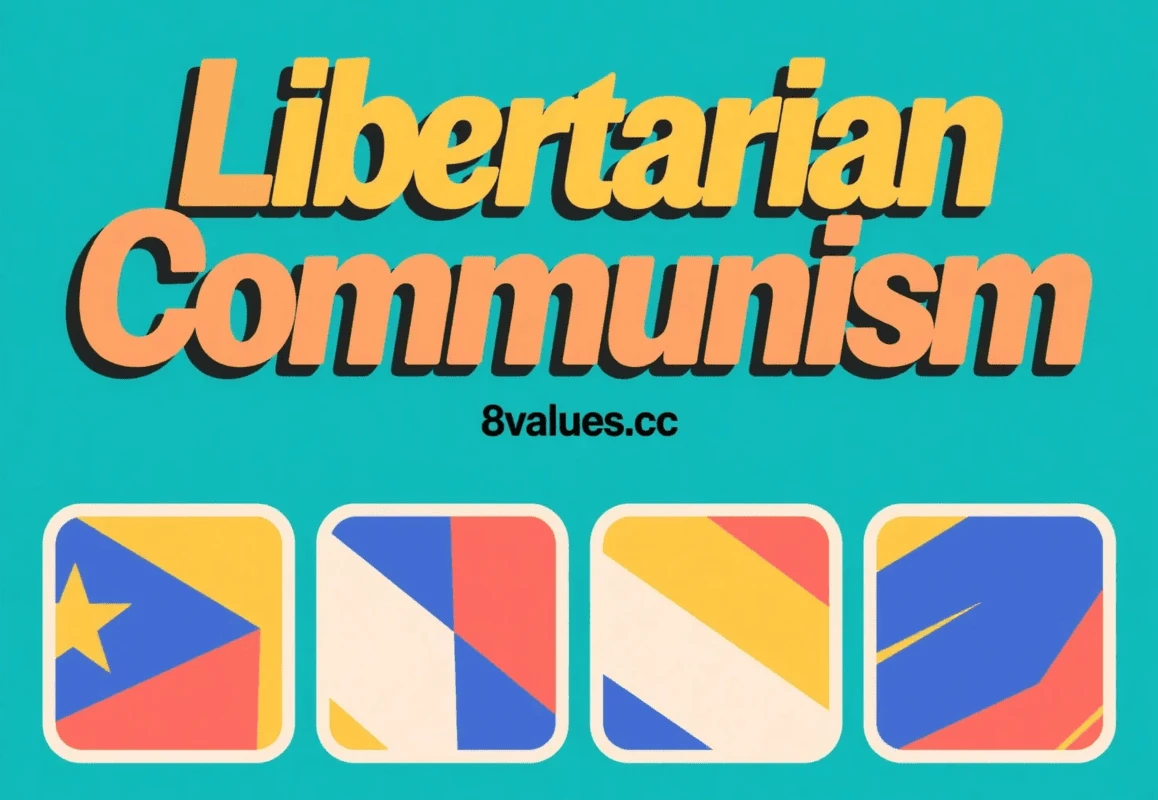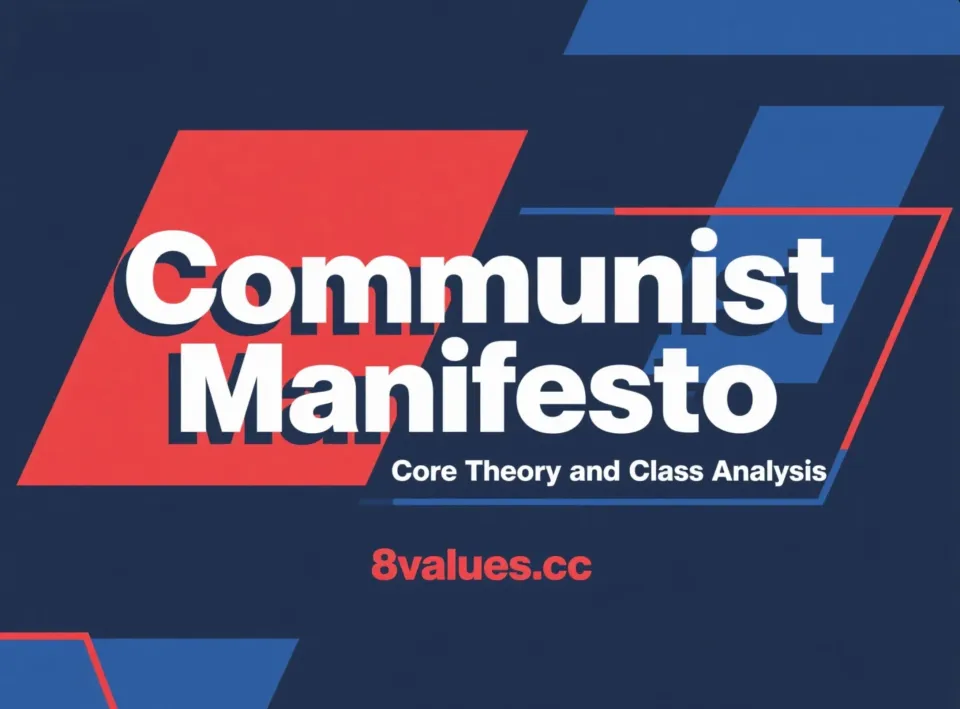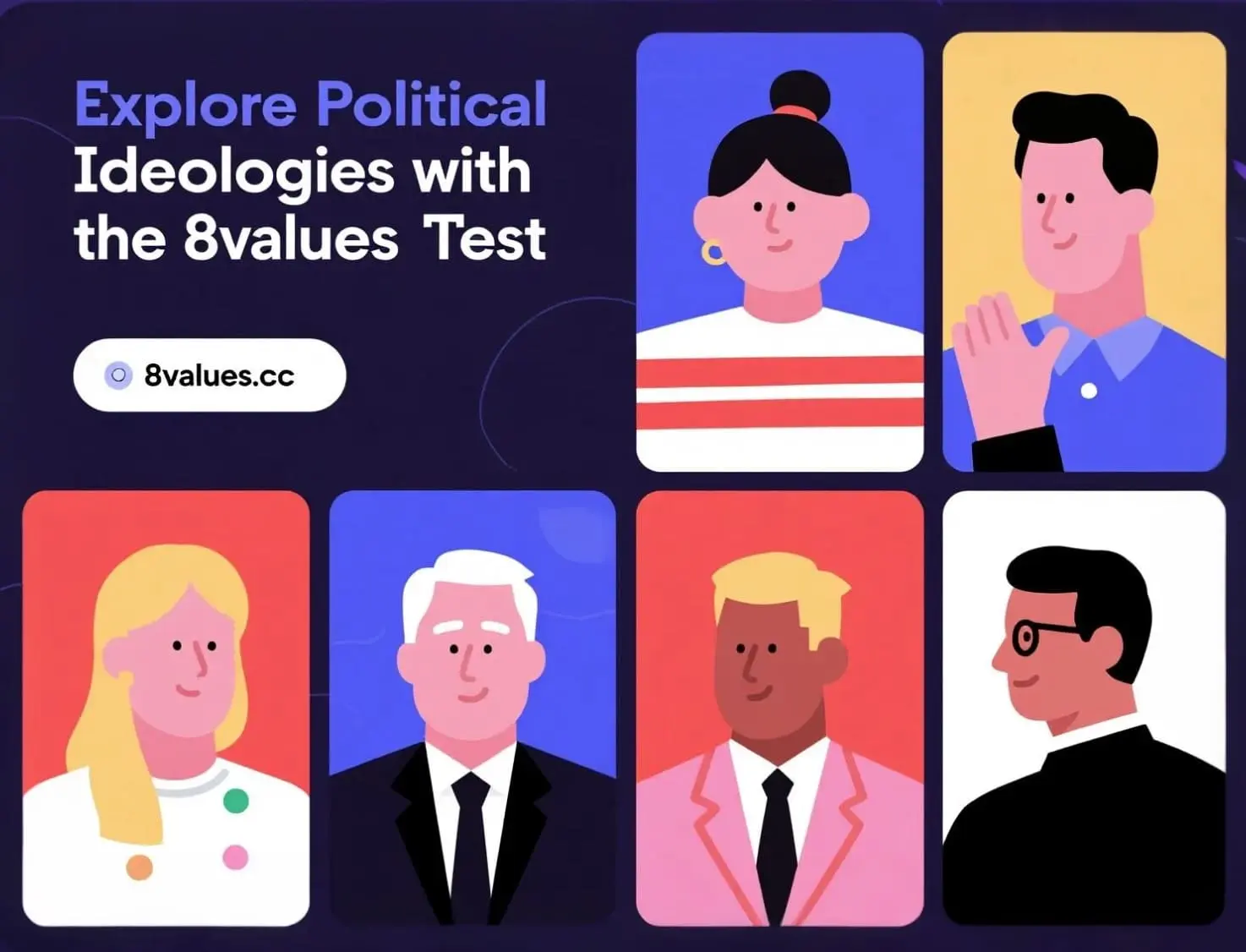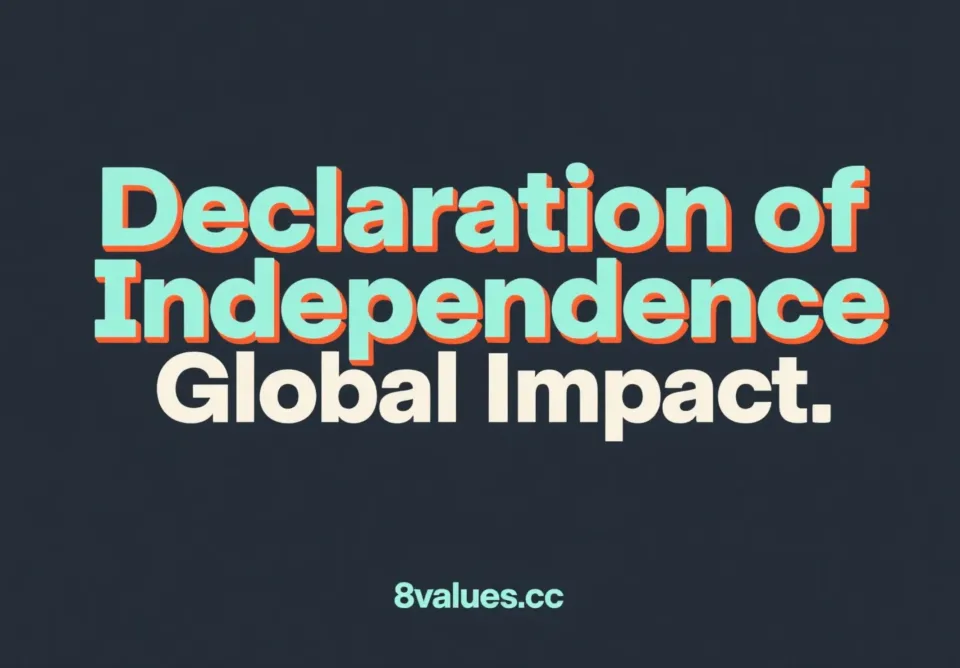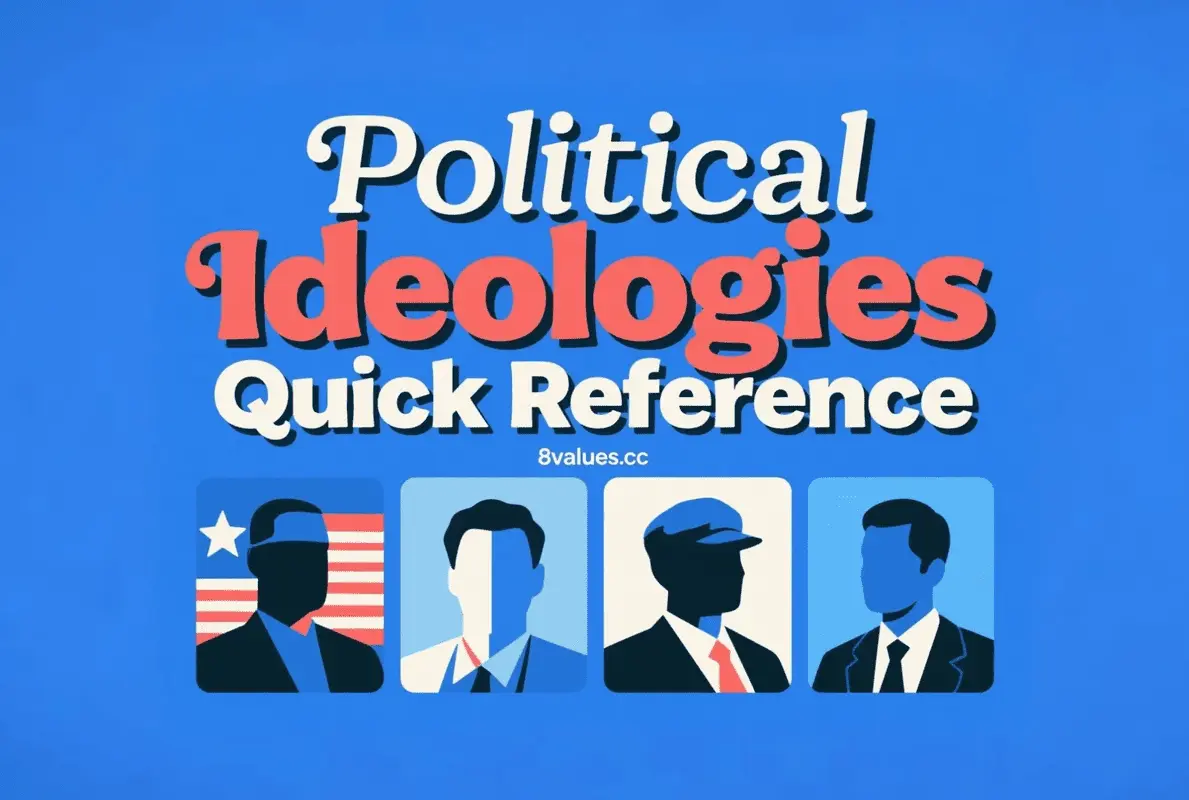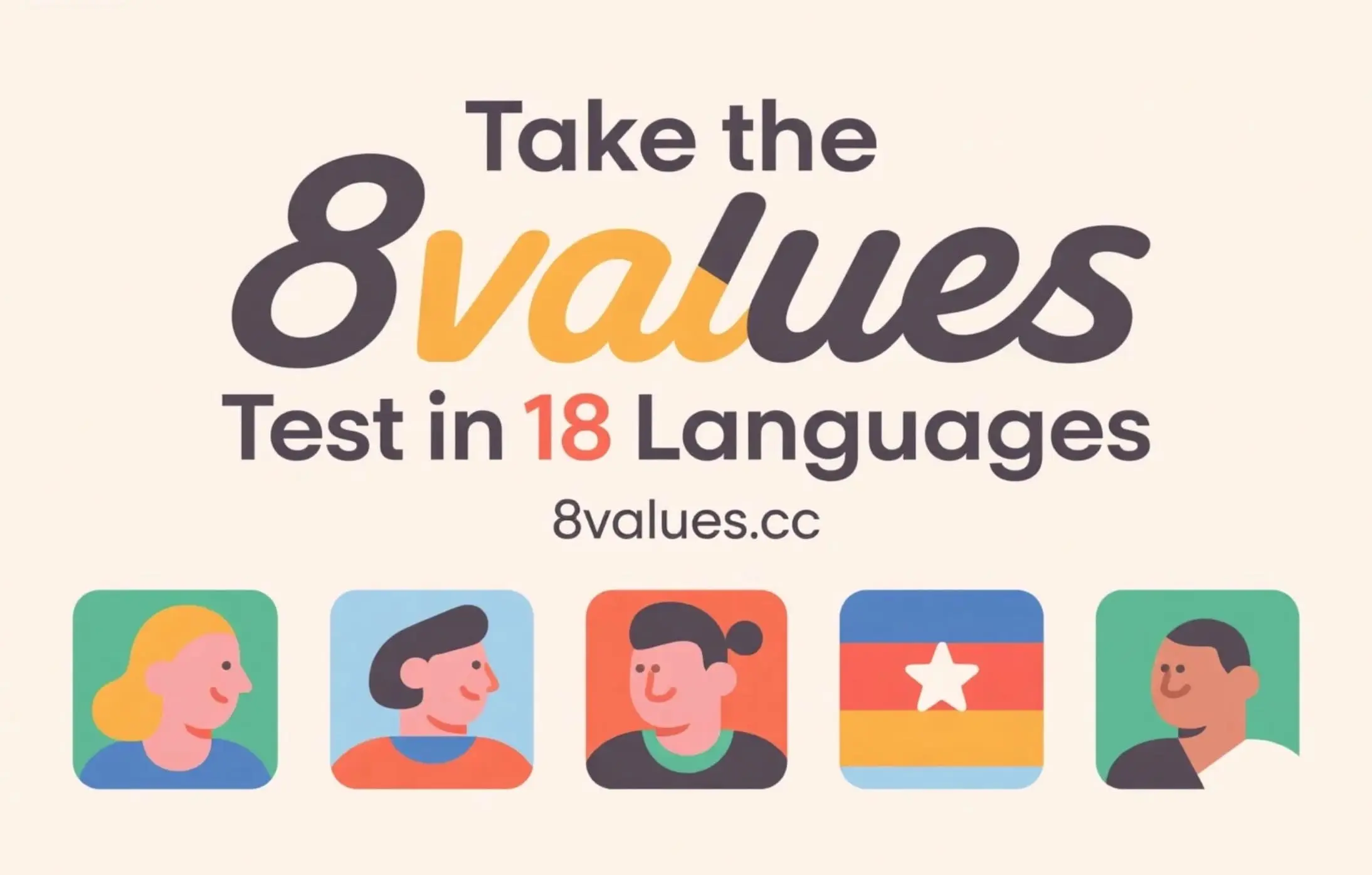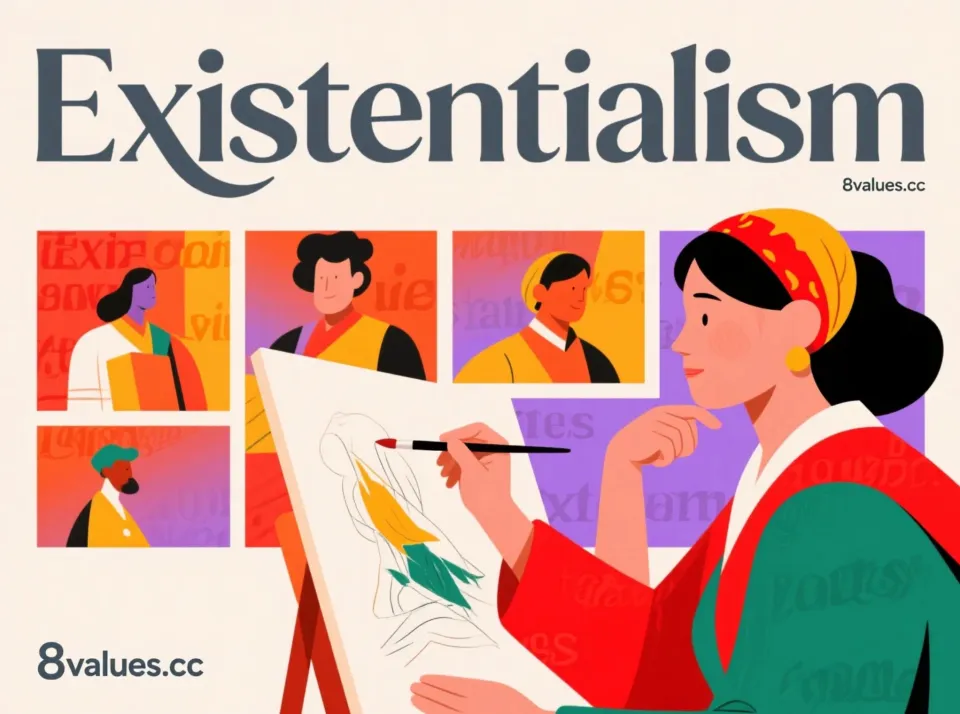Libertarian Communism | 8values Interpretation of ideological ideology in political tests
Understand the 8 values test results of Libertarian Communism: a political philosophy that combines the essence of anarchism and Marxism and advocates a state-free, class-free, and workers-autonomous society. This article will explore its core ideas, historical evolution, similarities and differences with other ideologies in detail, and analyzes its challenges and contemporary reflections to help you understand this complex and visionary left-wing thought more deeply in 8values Quiz.
Libertarian Communism , as a unique ideological interpretation in the 8 values political test results, represents a political philosophy that pursues ultimate personal freedom and thorough social equity . It incorporates communism’s vision for classless society and common prosperity , as well as liberalism’s firm claims against anti-authority , anti-state and decentralization . This trend of thought emphasizes that true liberation not only requires the elimination of capitalist economic exploitation, but also the abolition of all forms of state oppression and hierarchy.
The core concepts and characteristics of free will communism
Free will communism aims to establish a state-free society , class-free society , in which means of production (such as factories, land, etc.) are owned by social public ownership and democratically controlled by the community or workers' committee . Its core operating principle is the famous "divide your best and allocate as needed".
Complete anti-state and anti-authoritative stance
Free will communists believe that the state itself is a tool of oppression and control and must be abolished. They reject any centralized power structure, including communism in the form of Leninism and Bolshevikism . Instead, they advocate social organizations based on voluntary cooperation and direct democracy , believing that power should be returned to the people and given to their members by each group. Marx and Engels are also seen in some interpretations as anti-state revolutionaries, committed to overthrowing the state and ending slavery.
Public ownership and workers' autonomy
In a free-will communist society, the means of production belong to the entire community, not to individuals or countries. Society will be organized around workers’ committees and horizontal networks to ensure democratic control and direct participation in production and social affairs. This model of workers’ autonomy (or producer autonomy) aims to eliminate exploitation and alienation in capitalist production relations and make labor a self-realization activity rather than employed slavery. They believe that through cooperatives and other forms, workers can independently manage production and make all production decisions such as technology, working hours, and rhythm.
Freedom and Equality: Core Values
The goal of free will communism is to build a society without state coercion, capitalist exploitation and hierarchical power structures, thereby achieving true freedom and equality . This personal freedom is not only reflected in the right to choose, but also in the ability to get rid of poverty and hunger and gain comprehensive development. As Bakunin said, "Freedom without socialism is privilege and injustice; socialism without freedom is slavery and barbarity."
The historical roots and evolution of free will communism
The historical evolution of free will communism dates back to the 19th century, accompanied by the development of capitalism and the early class struggles of the working class .
Early development and key figures
The origin of this trend of thought is closely related to First International (1861-1871), which was originally called "revolutionary socialism" or "anti-authoritative socialism" and later evolved into anarchism , anarchism , or free will communism . Joseph Déjacque is considered the first to use the term “libertarian” in a political sense, while Peter Kropotkin is known as the founder of the principle of anarchic communism .
Spanish anarchist syndicalist Isaac Puente wrote the classic pamphlet "Free Will Communism" in 1932, elaborating on solutions to economic problems without state or political intervention. Georges Fontenis of the French Free Will Communism Union (FCL) further developed this theory by writing the Declaration on Free Will Communism in 1953. Daniel Guérin proposed "towards free will communism" in 1988, trying to combine the best ideas of anarchism and Marxism .
Practice in the Spanish Civil War
Free will communism achieved significant developments in the late 19th and early 20th centuries, especially in Spain. The Spanish anarchist movement , namely the CNT-FAI (National Labor Union-Iberian Anarchist Federation), implemented the principle of free will communism during the Spanish Civil War (especially in the Catalonian region) to collectivize industry and agriculture. These practices provide real examples of stateless society and workers’ autonomy . Helios Gómez , a Spanish artist and political activist, is a well-known free will communist and advocate of Roma's identity.
Similarities and similarities with mainstream communism and liberalism
As a unique political ideology , free will communism has both commonalities and significant differences with traditional communism and liberalism .
Criticism of traditional Marxism
Free will communism emphasizes the anti-authority and free will in Marxism , and is critical of centralized and national socialist models such as Leninism and Bolshevikism . These criticized institutions, such as the former Soviet Union, were considered essentially state capitalist society rather than real communism . Free will communism rejects the concepts of “ proletarian dictatorship ” and “transitional period”, and they seek a social revolution deeper than state control to achieve true workers’ autonomy and democracy .
Complex relationship with liberalism
Free will communism and liberal willism (broadly speaking, the commitment to freedom) share the value of personal freedom . Some views even believe that Marx and Engels were in a sense "classical liberals" who were committed to the goal of the bourgeois revolution , but they believed that their vision of freedom could no longer be fully realized after the industrial revolution and needed to be completed and surpassed through communism .
However, liberal communism refuses to simplify it to "super liberalism" because it may lose its materialist, historic and revolutionary characteristics as a result. It believes that " freedom " without a fair economy is meaningless because people still face the choice of "work or starving"; similarly, "socialism" without the concept of freedom is not truly fair and equal . It pursues economic freedom from poverty and exploitation, rather than mere formal freedom of contract. This idea is also called free will socialism and believes that the two are complementary rather than opposite.
Personal freedom and social liberation: the promise of free will communism
Free will communism firmly believes that true social liberation must fundamentally solve economic problems and fully respect personal freedom . It goes beyond the traditional perspective of merely focusing on welfare or wealth distribution, and regards freedom as the ultimate goal of revolutionary action .
Meet needs and respect individuality
In a free-will communist society, the goal is to meet everyone's economic needs while respecting their desire to pursue freedom to the greatest extent. This means rejecting any barracks-style or ant-hole communism , as well as the Russian shepherd-flock communism , because they sacrifice personal freedom . On the contrary, it advocates that everyone contributes according to their personal abilities and obtains them according to their personal needs , thereby achieving comprehensive development and self-realization of their individuals .
Elimination of labor alienation and self-realization
In the vision of free will communism , labor is no longer a compulsory activity of alienation, but a way for individuals to express creativity and develop multi-faceted talents. The public ownership of means of production and workers' autonomy enable workers to independently manage the production process, select technology, arrange working hours and rhythms, and even innovate. This will make labor less frustrating and full of opportunities for self-fulfilment . For example, by shortening work days, people will have more free time to develop their personal talents and enrich their personal lives.
The model of economic organization and social governance
The society envisioned by free will communism will operate through decentralized direct democratic mechanisms and publicly owned economic organizations to ensure freedom and equality .
Free Union and Free Town
Future social life will be organized around the existing " free trade unions " and " free towns ". The union will spontaneously unite the workers of factories and all collective exploitation sites; while the free municipalities (or communes) are councils spontaneously formed by rural residents, with all the power to manage local affairs, especially production and distribution. This model can maximize common ground and promote social harmony .
Public products and on-demand distribution
A free will communist society will provide a wide range of social products such as education, medical care, security, roads, justice, forests, water, etc. These products may be available at zero cost (pure social products) or below cost price (fake social products) to ensure that all citizens can obtain them according to their needs . Marx and Engels suggested funding these public goods through a progressive tax system, thus achieving the principle of "doing all your best" contribution. This distribution model is designed to expand individual freedom , especially for those most vulnerable.
Efficiency and Democracy Program
Free will communism believes that workers’ self-managed cooperatives are more efficient than capitalist enterprises, especially in dealing with information asymmetry. Cooperatives can effectively solve opportunistic behavior by increasing participation, enhancing member loyalty, and promoting mutual supervision among colleagues. At the same time, Marx also pointed out that the united cooperatives can regulate national production according to a common plan, replacing the anarchy and cyclical crisis of capitalism, which is "possible communism ." This democratic plan not only broadens economic freedom , but also a form of political self-management .
Challenges, misunderstandings and contemporary reflections
Although free will communism depicts a beautiful vision, it also faces many challenges and misunderstandings in its theoretical construction and practical application.
Utopian Criticism and Realism
Critics often believe that free will communism is unrealistic and utopian . Marx and Engels themselves also criticized the "castle in the air" conception of utopian socialism . They believed that communism was not an ideal state to be established, but a " realistic movement to abolish the status quo of things." This means communism is a political process driven by specific individuals , conflicting groups and classes , aiming to expand its freedoms .
Risks of “Vanguard” and “Political Class”
The Free Will Communism Declaration criticizes the concepts of " proletarian dictatorship " and "transitional period", but is also questioned for the use of terms such as " party " and " vanguard ", which have specific meanings in Leninism and are prone to risk that minorities will replace the entire working class . The declaration believes that the "vanguard" should be internal to the class , not the external professional revolutionaries envisioned by Lenin , but still needs to be highly vigilant about these terms.
A modern critical interpretation of "free will communism"
It is worth noting that some contemporary critics describe the modern hybrid economic system in the United States, Europe, and China as a kind of " free will communism " or " new communism ." This view holds that these systems combine liberalism 's financial freedom (through subsidies) and social freedom (through anarchy) with socialism 's collectivization and high taxation, supplemented by authoritative coercion of groups such as "Wall Street-style financialization" and "Social Justice Warrior/Antifa" (SJW/Antifa). This critical perspective holds that this hybrid system rewards monopoly, forming a "pseudo-economy", conceals the potential directive economy, and uses " communist anarchic totalitarian control methods" such as exclusion, cancellation of platforms, and gas lamp effects to control populations. They believe that the ultimate goal of such a " free will communist state " is global unity and world hegemony, the pursuit of compulsory thorough equality to eliminate all hierarchies, ultimately resulting in the minority having power, wealth and status while the rest tends to be consistent.
However, this interpretation is clearly tensioned with the core concept of free will communism (i.e., eliminating oppression and realizing true freedom and equality ). From the perspective of free will communism , the strength of the state and capital, as well as the control of a few elites, is precisely the manifestation of oppression and infreedom they oppose. Therefore, when understanding this complex concept, it is crucial to distinguish the original meaning of its political philosophy from the critical analysis of its possible alienated forms in modern society.
Conclusion: Free will communism as the "realistic movement"
Free will communism is not only a future ideal, it is also a " realistic movement that abolishes the status quo of things." It represents the class struggle of the working class to fight capital needs in daily life to maintain and improve its own conditions. This spirit of resistance always exists in all societies where injustice and exploitation exists, and also indicates that a world based on freedom and equality is possible.
Whether called " anarchical communism ", " free will communism " or " socialism ", the key lies not in its name, but in its vivid embodiment of personal needs , desires and spirit of resistance . By understanding the deep connotation of free will communism , we can better participate in the process of social revolution and work hard to achieve a truly free , equal and democratic future. If you have a deeper interest in exploring your political ideology , you might as well try the 8values political values test and read its ideological introduction in detail. The 8values blog has various classic content, which will give you a deeper understanding of various political philosophy.
